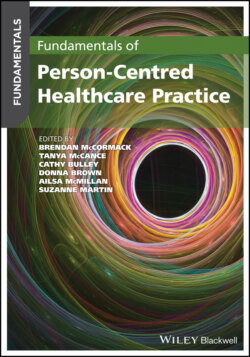Читать книгу Fundamentals of Person-Centred Healthcare Practice - Группа авторов - Страница 42
Person‐centredness and related concepts
ОглавлениеWe need to challenge individualistic views of persons and person‐centredness, especially in healthcare, where shared values, team identity, organisational cultures and norms have a major effect on how we work and how service users experience healthcare. In Chapters 13 and 16, this is discussed in the context of ‘human agency’ and providing holistic care. We are all ‘persons’ and so the values of person‐centredness need to apply to all of us in any context – this is why person‐centredness and person‐centred practice are not just about ‘patient care’ but instead these core values apply to all persons. This is one of the clear distinctions between person‐centredness and other similar concepts, such as patient‐centredness, client‐centredness, woman‐centredness and child‐centredness. We define some of these associated concepts in Table 2.2.
Table 2.2 Associated concepts
| Concept | Definition |
|---|---|
| Patient‐centredness | Patient‐centred care seeks to ensure that the needs of individuals requiring care are met with respect and responded to as persons, through respect for their values, preferences, choices and relationships and is inclusive of the individual’s family |
| Client‐centredness | Client‐centred care originates from the work of Carl Rogers (1961) and his approach to psychotherapy (also called person‐centred therapy). By using the term ‘client’ instead of ‘patient’, Rogers placed importance on the individual seeking assistance, making autonomous decisions and engaging in self‐work to overcome their difficulties. Self‐direction is a central principle in client‐centred practice and the role of the nurse is that of ‘professional guide’ |
| Woman‐centredness | Woman‐centred care is a term used to describe a holistic philosophy of maternity care that recognises each woman's biopsychosocial, emotional and spiritual needs as defined by her own context |
| Child‐centredness | Child‐centred care means placing children and their interests at the centre of practice and recognises children and young people as active participants in their care |
| Family‐centredness | Family‐centred care is a term used in healthcare services for children and young people. It means that a child in need of care can never be considered as a single individual patient, but that the family is the unit of care as the parents and wider family are central to the child's health and well‐being |
| Relationship‐centredness | Relationship‐centred care originates from the work of Nolan et al. (2004). It emphasises the promotion of positive relationships in meeting the needs of persons needing care as well as relatives/friends and staff |
These associated concepts may have some similarities with person‐centredness, as they may share some of the values of personhood, but not all. You may also notice that not all persons are considered equal in some of these perspectives and that they differ according to the emphasis they place on the power relationship, the focus of the relationship and equality of decision making.
